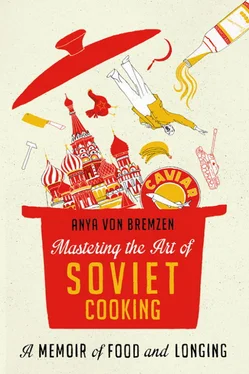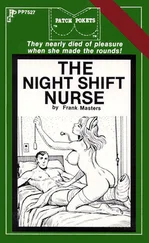I first glimpsed—or rather heard —the world of privileged food consumption during my first three years of life, at the grotesque communal Moscow apartment into which I was born in 1963. The apartment sat so close to the Kremlin, we could practically hear the midnight chimes of the giant clock on the Spassky Tower. There was another sound too, keeping us up: the roaring BLARGHHH of our neighbor Misha puking his guts out. Misha, you see, was a food store manager with a proprietary attitude toward the socialist food supply, likely a black market millionaire who shared our communal lair only for fear that flaunting his wealth would attract the unwanted attention of the anti-embezzlement authorities. Misha and Musya, his blond, big-bosomed wife, lived out a Mature Socialist version of bygone decadence. Night after night they dined out at Moscow’s few proper restaurants (accessible to party bigwigs, foreigners, and comrades with illegal rubles), dropping the equivalent of Mom’s monthly salary on meals that Misha couldn’t even keep in his stomach.
When the pair stayed home, they ate unspeakable delicacies—batter-fried chicken tenders, for instance—prepared for them by the loving hands of Musya’s mom, Baba Mila, she a blubbery former peasant with one eye, four—or was it six?—gold front teeth, and a healthy contempt for the nonprivileged.
“So, making kotleti today,” Mila would say in the kitchen we all shared, fixing her monocular gaze on the misshapen patties in Mom’s chipped aluminum skillet. “Muuuuusya!” she’d holler to her daughter. “Larisa’s making kotleti!”
“Good appetite, Larochka!” (Musya was fond of my mom.)
“Muuusya! Would you eat kotleti?”
“Me? Never!”
“Aha! You see?” And Mila would wag a swollen finger at Mom.
One day my tiny underfed mom couldn’t restrain herself. Back from work, tired and ravenous, she pilfered a chicken nugget from a tray Mila had left in the kitchen. The next day I watched as, red-faced and teary-eyed, she knocked on Misha’s door to confess her theft.
“The chicken?” cackled Mila, and I still recall being struck by how her twenty-four-karat mouth glinted in the dim hall light. “Help yourself anytime— we dump that shit anyway .”
And so it was that about once a week we got to eat shit destined for the economic criminal’s garbage. To us, it tasted pretty ambrosial.
In 1970, into the eleventh year of their on-and-off marriage, my parents got back together after a four-year separation and we moved to an apartment in the Arbat. And kulebiaka entered my life. Here, in Moscow’s most aristocratic old neighborhood, I was shooed out of the house to buy the pie in its Soviet incarnation at the take-out store attached to Praga, a restaurant famed “before historical materialism” (that’s ironic Sovietese for “distant past”) for its plate-size rasstegai pies with two fillings: sturgeon and sterlet.
Even in the dog days of Brezhnev, Praga was fairly dripping with klass —a fancy restoran where Misha types groped peroxide blondes while a band blasted, and third-world diplomats hosted receptions in a series of ornate private rooms.
“Car of Angola’s ambassador to the door!”
This was music to my seven-year-old ears.
If I loitered outside Praga intently enough, if my young smile and “ Khello, khau yoo laik Moskou?” were sufficiently charming, a friendly diplomat might toss me a five-pack of Juicy Fruit. The next day, in the girls’ bathroom, aided by ruler and penknife, I would sell off the gum, millimeter by millimeter, to favored classmates. Even a chewed-up blob of Juicy Fruit had some value, say a kopek or two, as long as you didn’t masticate more than five times, leaving some of that floral Wrigley magic for the next masticator to savor. Our teacher’s grave warnings that sharing capitalist gum causes syphilis only added to the illegal thrill of it all.
I loved everything about shopping at Praga. Loved skipping over the surges of brown melted snow and sawdust that comrade janitors gleefully swept right over the customers’ feet. Loved inhaling the signature scent of stale pork fat, peregar (hangover breath), and the sickly sweet top notes of Red Moscow perfume. Loved Tyotya Grusha (Aunt Pear), Praga’s potato-nosed saleslady, clacking away on her abacus with savage force. Once, guided by some profound late socialist instinct, I shared with Grusha a five-pack of Juicy Fruit. She snatched it without even a thank-you, but from then on she always made sure to reserve a kulebiaka for me. “Here, you loudmouthed infection,” she’d say, also slipping me a slab of raisin-studded poundcake under the counter.
And this is how I came to appreciate the importance of black marketeering, blat (connections), and bribery. I was now inching my own way toward privilege.
Wearing shiny black rubber galoshes over my valenki (felt boots) and a coat made of “mouse fur” (in the words of my dad), I toted the Pravda -wrapped kulebiaka back to our family table, usually taking the long way home—past onion-domed churches now serving as warehouses, past gracious cream and green neoclassical facades scrawled with the unprintable slang that Russians call mat . I felt like Moscow belonged to me on those walks; along its frozen streetscape I was a flaneur flush with illicit cash. On Kalinin Prospect, the modernist grand boulevard that dissected the old neighborhood, I’d pull off my mittens in the unbearable cold to count out twenty icy kopeks for the blue-coated lady with her frosty zinc ice cream box. It was almost violent, the shock of pain on my teeth as I sank them into the waffle cup of vanilla plombir with a cream rosette, its concrete-like hardness defying the flat wooden scooping spoon. Left of Praga, the Arbatskaya metro station rose, star-shaped and maroon and art deco, harboring its squad of clunky gray gazirovka (soda) machines. One kopek for unflavored; three kopeks for a squirt of aromatic thick yellow syrup. Scoring the soda: a matter of anxious uncertainty. Not because soda or syrup ran out, but because alkogoliks were forever stealing the twelve-sided beveled drinking glass—that Soviet domestic icon. If, miraculously, the drunks had left the glass behind, I thrilled in pressing it hard upside down on the machine’s slatted tray to watch the powerful water jet rinse the glass of alcoholic saliva. Who even needed the soda?
Deeper into Old Arbat, at the Konservi store with its friezes of socialist fruit cornucopias, I’d pause for my ritual twelve-kopek glass of sugary birch-tree juice dispensed from conical vintage glass vats with spigots. Then, sucking on a dirty icicle, I’d just wander off on a whim, lost in a delta of narrow side streets that weaved and twisted like braids, each bearing a name of the trade it once supported: Tablecloth Lane, Bread Alley. Back then, before capitalism disfigured Moscow’s old center with billboards and neons and antihistorical historicist mansions, some Arbat streets did retain a certain nineteenth-century purity.
At home I usually found Mom in the kitchen, big black receiver under her chin, cooking while discussing a new play or a book with a girlfriend. Dad struck a languid Oblomovian pose on the couch, playing cards with himself, sipping cold tea from his orange cup with white polka-dots.
“And how was your walk?” Mother always wanted to know. “Did you remember to stop by the house on Povarskaya Street where Natasha from War and Peace lived?” At the mention of Tolstoy, the Juicy Fruit in my pocket would congeal into a guilty yellow lump on my conscience. Natasha Rostova and my mom—they were so poetic, so gullible. And I? What was I but a crass mini-Misha? Dad usually came to the rescue: “So, let’s have the kulebiaka. Or did Praga run out?” For me, I wanted to reply, Praga never runs out! But it seemed wise not to boast of my special blat with Aunt Grusha, the saleslady, in the presence of my sweet innocent mother.
Читать дальше












